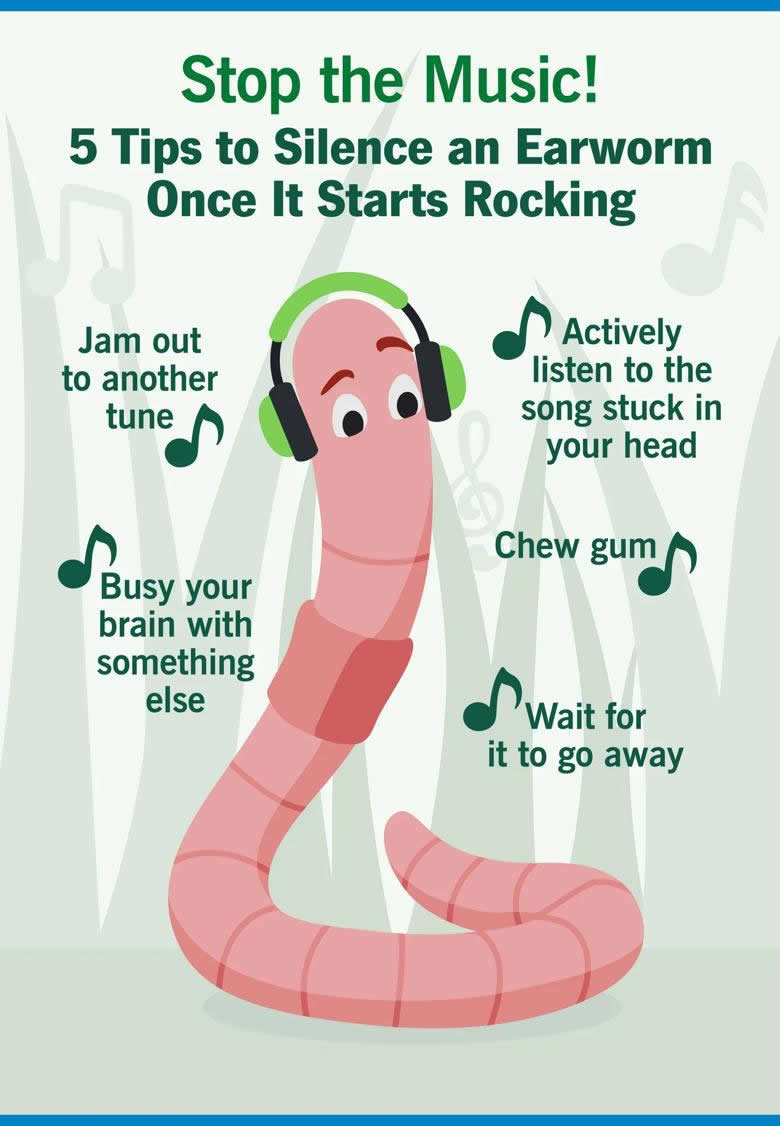Earworms: Why Certain Songs Get Stuck in Your Head
‘Tune wedgies’ can play on repeat due to your brain’s storage and operating system — and something known as the phonological loop

A certain catchy tune pops into your head out of nowhere — and it won’t stop playing. The song just keeps going on a seemingly endless loop. Our diagnosis? You’ve been infected with an earworm.
Psychologist Kia-Rai Prewitt, PhD, explains what that means and what you can do to hit pause.
What is an earworm?
“Earworm” is the colorful term for a song that gets stuck on repeat mode in your head. The name comes from the German word ohrwurm, which has long been used to describe this phenomenon.
The phrase is also a nod to the earwig, a creepy-looking insect accused of crawling into people’s ears to wander their brain. (The bugs typically don’t do that, by the way.)
“The imagery of an earworm is pretty spot on when you think about it,” says Dr. Prewitt. “These songs crawl into your head, seemingly out of nowhere, and then just keep going on and on.”
A more scientific term for this experience is involuntary musical imagery, or INMI — a perfect acronym if you think about it. Less official names include stuck song syndrome, musical imagery repetition and tune wedgies.
Most earworms are just a portion of a song running 15 to 30 seconds. It’s often the repetitive “hook” of a song, or that infectious chorus you can belt out without even thinking about the words.
Why do songs get stuck in your head?
Your brain’s storage and operating system — and particularly something known as the phonological loop — creates an ideal environment for an earworm to boogie-woogie all over your grey matter.
The phonological loop connects your auditory cortex — the part of your brain responsible for processing sounds — to other areas of your brain that deal with memory and emotions.
“There are a lot of complexities as to why earworms happen, but there’s typically a trigger that connects a song to a memory or emotion,” explains Dr. Prewitt. “Next thing you know, it’s playing in your head.”
It doesn’t take much to get a concert started in your cranium either. Hearing a certain word or sound might do it. Ditto for seeing a picture or tasting something that takes you back to a certain time and place in your memories.
But to be honest, it’s hard to pinpoint exactly what unleashes an earworm: “It really doesn’t take much to get it going,” says Dr. Prewitt.
Are certain songs more likely to be earworms?
Absolutely! Songs tend to be stickier with:
- Repetitiveness
- A simple yet distinctive melody, often involving a rising then falling pitch
- Chart-topping success
Examples include tunes like “Bad Romance” by Lady Gaga and “We Will Rock You” by Queen.
Are some people more likely to experience earworms?
Earworms are extremely common, with nearly 90% of people in one study saying they experience them at least once a week. But certain traits or conditions can make you more likely to queue up an internal song. The list includes:
- Being an avid music listener: The more tunes you put in your head, the more likely you are to have one of them start playing in your noggin at random times.
- Obsessive-compulsive disorder (OCD): A study found that earworm frequency is strongly associated with 22 OCD behaviors, including physical movements (like foot tapping) and repetitive mental behaviors (like counting and spelling).
- Stress and anxiety: Some researchers believe that the mental load carried during stressful times can open the door for earworms to take the stage.
How to get rid of an earworm

So, what can you do to evict an earworm? Here are a few things to try:
- Listen to the whole song: Remember how earworms typically are short bursts of a song? Well, it turns out that listening to the whole tune might “unstick” that one catchy part from your brain. “Lean into it,” advises Dr. Prewitt.
- Hit shuffle on your playlist: Rocking out to another song can help push a stubborn earworm out of your mind. (Just be careful not to sub in another one!)
- Refocus your thoughts: Watch a movie. Go for a walk. Call someone on the phone. Do a puzzle. “Doing something that brings you into the present can help get that earworm out,” recommends Dr. Prewitt.
- Chew gum: Researchers found that chewing gum can reduce musical thoughts by interfering with your verbal memory.
And if all else fails, just wait. Earworms don’t last forever, even if they feel like they do!